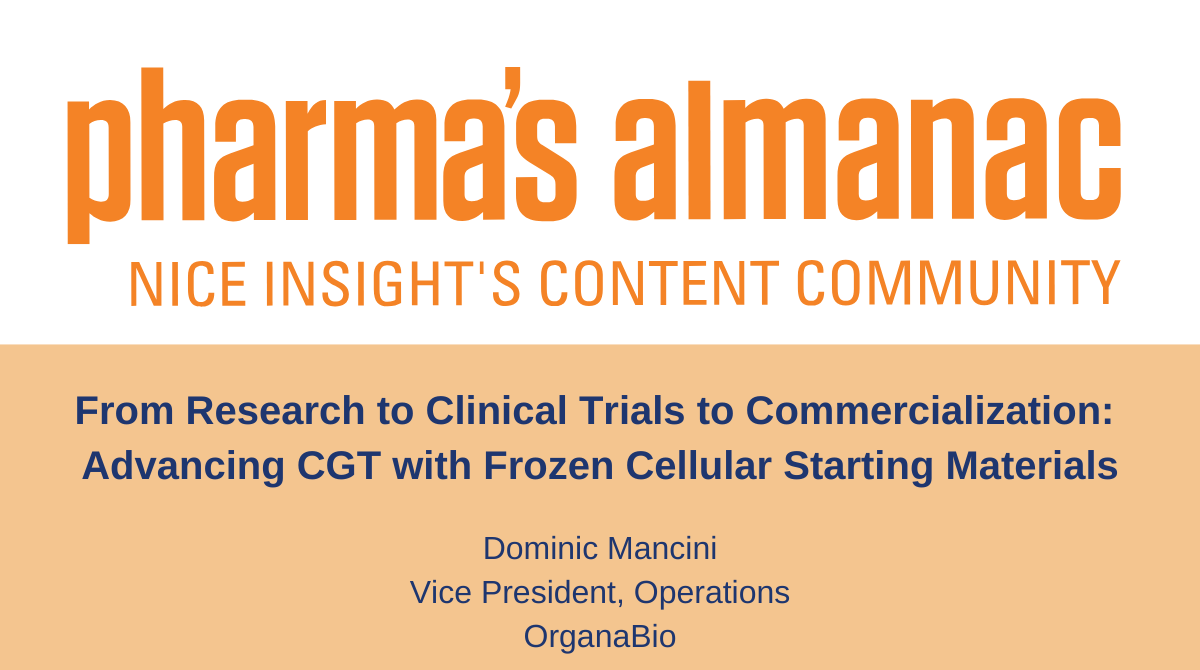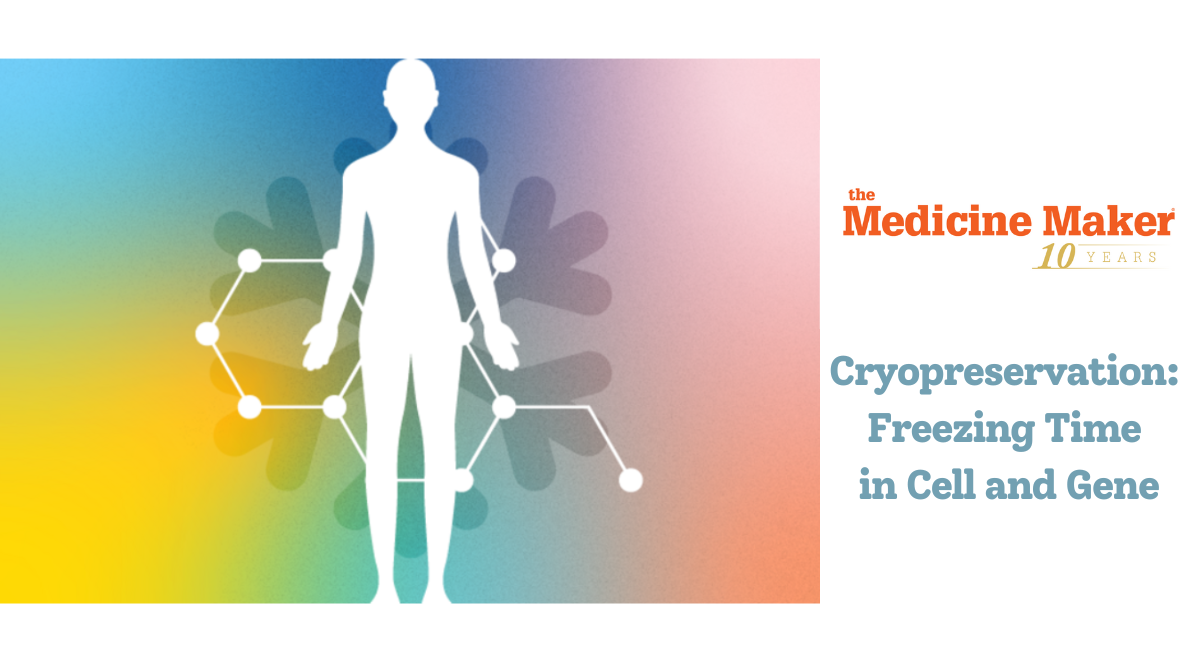Although using fresh donor cells may seem cost-effective during the early stages of cell and gene therapy (CGT) development, relying on them can create significant hurdles as programs progress toward clinical trials and commercialization. Fresh cells vary significantly from donor to donor and even between collections from the same donor, making it challenging to replicate experimental results and leaving little room for manufacturing errors. Fresh cells are also highly perishable, creating additional issues when shipments are delayed. While the direct cost of frozen cells is higher, it represents a minor fraction of the overall cost of developing and commercializing a cell therapy. Ultimately, utilizing frozen material can prevent costly delays and ensure a smoother development pathway. In this Pharma Almanac’s article, Dominic Mancini, VP of Operations, OrganaBio, discusses how by driving efficiency, OrganaBio aims to make frozen cellular materials more accessible without compromising the consistency and quality needed to advance cell therapy development.
Unlocking Efficiency and Reducing Risk with Frozen Cellular Material
CGT development progresses through multiple phases, each more challenging and costly than its predecessors. At the research stage, developers often favor fresh cells because they are less expensive and the required laboratory resources are often flexible. This preference for “fresh” is driven partly by the need to deliver the best preclinical data possible and secure additional funding for clinical activities. Frozen cellular starting materials come with a premium price tag due to the additional labor and cryopreservation reagents required, but ultimately the additional cost is insignificant compared to the broader economic and logistical benefits they deliver as programs advance toward commercialization.
Fresh Cells: A Risky Bet for Late-Stage Development
There will always be inherent variability when working with patient and/or donor materials. Even cells collected from the same donor can differ significantly between collections due to factors such as health status, lifestyle, or timing of collection. This variability makes it challenging to predict, let alone control, critical quality attributes (CQA), such as infectious disease marker (IDM) status, cell counts, and even frequency of key cell sub-opulations. These CQAs may be flexible at early stages but they become increasingly critical as developers strive to demonstrate process robustness, particularly when following a quality-by-design (QbD) approach. QbD requires reproducible data sets to justify and validate a defined design space — true replicates are difficult to execute with perishable fresh material, where the precise composition of specific cell types, like T cells or NK cells, cannot be guaranteed and no two collections are the same.
The logistical challenges of transporting fresh donor cells further compound the issue. Freshly collected material must be shipped immediately and at risk, often before IDM testing, immunophenotyping, or other characterization testing is completed. Manufacturing often proceeds at risk, and if an infectious disease is detected, any resulting data or products may need to be discarded. If the prevalence of a key cell type (i.e., T cells) does not meet process requirements, then manufacturing may not be able to proceed at all. Perhaps the most difficult to mitigate are the inevitable shipment delays caused by reliance on commercial airlines for transport of these key starting materials. Early on, an unexpected hiccup may cost the developer a few weeks of delay and a few thousand dollars of wasted materials/reagents, but during clinical stages the manufacturing slots can cost orders of magnitude more than the reagents themselves and in many instances are non-refundable. Reliance on fresh starting materials in clinical and commercial stages dramatically increases the risk of significant delay, financial loss, and negative impact to patients.
Unexpected Delays and Hidden Costs
The perishable nature of fresh cells introduces significant risk when executing comparability studies or performing technology transfers to contract development and manufacturing organizations (CDMOs). Fresh cells must be used immediately, leaving no opportunity to repeat or restart if a critical error occurs during processing or material is delayed in transit. This is especially problematic when working with material from donors who must meet specific criteria since the original donor is deferred for weeks after collection and sourcing material from another donor meeting the same criteria under tight timelines can be extremely difficult. The inability to repeat processing of fresh material means that a single operator error can result in wasted resources and costly delays.
Insuring shipments of fresh leukopaks adds another layer of complexity and often fails to mitigate the risks to late-stage manufacturing. Time-sensitive deliveries are particularly vulnerable to logistical issues, including delays, damage, or loss in transit, which can derail high-stakes production schedules. It is industry standard for shipping risk to be transferred to the purchaser (developer) the moment transit is initiated. While it is possible to insure the shipment, coverage is often limited to a complete shipment loss and does not cover the indirect costs of a shipment delay. Shipping delays of even a few hours can become extremely expensive, particularly if the CDMO must adjust production schedules to accommodate delays – assuming they have the flexibility to do so. These challenges underscore why frozen cells, shipped and delivered days before use, are a far more reliable option for reducing risk and ensuring continuity throughout the cell therapy development process.
Frozen Cells Offer Flexibility and Efficiency
Frozen cells address many of the challenges associated with fresh material, offering consistency, flexibility, and predictability that are critical for clinical and commercial manufacturing. When regulatory agencies require rapid follow-up data — such as in response to adverse events — an inventory of frozen material allows developers to act quickly and generate the critical data required to lift a clinical hold. Previously characterized donor material can be accessed immediately, enabling the rapid design and execution of experiments to address regulatory concerns without delay.
Frozen cellular starting materials also enable many mission-critical efficiencies in commercial manufacturing operations. A fourth industrial revolution, often referred to as “Industry 4.0,” is expected to leverage automation, digitization, and concurrent manufacturing to reduce the cost of delivering cell and gene therapies. Implementing and combining these technologies requires significant investment but is often touted as the solution to creating economies of scale and making these therapies accessible. These expensive GMP-compliant systems must operate at peak capacity to maintain economic viability. Using fresh cells, with their inherent variability and shipping risks, introduces unacceptable delays to production schedules and prohibits realizing the full benefit of these technologies. In contrast, frozen cells allow developers to plan manufacturing runs with extreme precision, maximizing equipment utilization and ensuring consistent production while maintaining quality and reliability.
While frozen cells may carry a higher upfront cost, this expense is minimal compared to the cumulative costs of clinical trials, CDMO production, and regulatory challenges. As development programs advance, the limitations of fresh cells become increasingly apparent. Transitioning from fresh to frozen donor material requires comparability studies, which are complex, costly, and time-consuming. The bar for demonstrating comparability to regulatory agencies only increases as clinical trials progress. Ultimately, frozen cells offer the only truly scalable and commercially viable solution. By investing in frozen starting material from the outset, developers avoid the downstream risks and inefficiencies associated with fresh donor cells, ensuring long-term success and streamlined progress toward commercialization.
From Startups to Big Pharma: How Industry Players Approach Frozen Cells
Experience remains the most effective teacher when it comes to recognizing the advantages of frozen cellular material for cell therapy development. Large biopharma companies with approved cell therapies widely acknowledge frozen cells as the only scalable option for commercialization. These companies take a proactive approach by screening hundreds of donors to identify ideal candidates, reserving their leukocyte collections, and freezing their cellular material in appropriately sized aliquots to support ongoing process development, analytical development, and manufacturing activities. This practice ensures consistent access to high-quality cellular raw materials and eliminates many of the risks associated with reliance on fresh cells.
Medium-sized companies tend to split into two groups. Those with sufficient experience — or with team members who bring expertise from large-scale projects — recognize the challenges of using fresh material. Many have already conducted comparability studies and transitioned to frozen cells, understanding the risks and long-term costs of relying on fresh donor material. Others, however, prioritize short-term cost savings and remain vulnerable to the logistical and operational hurdles that arise as their programs advance.
Small startups and early-stage biopharma companies often default to using fresh cells to minimize initial costs. This short-term, “we’ll cross that bridge when we get there,” approach can have significant long-term consequences. Fresh cellular material introduces challenges in securing consistent donor availability, particularly when specialized donor profiles are required. Early developers often underestimate the complexities of scaling production or meeting regulatory expectations with fresh donor material.
Moreover, the use of fresh cells can negatively impact a program’s ability to attract large pharmaceutical partners. Potential acquirers evaluating the viability of cell therapy programs during due diligence are likely to be deterred by processes built around fresh donor material. The reliability and reproducibility of these programs are difficult to assess. For emerging companies hoping for acquisition or partnership, frozen cells present a clear advantage in building confidence and credibility with Big Pharma.
Supporting Early-Stage Developers with Cost-Effective Frozen Solutions
While frozen cells represent a small fraction of the overall cost of cell therapy development, OrganaBio understands the financial constraints faced by academic researchers and small or emerging biopharma companies. In academia, budget limitations often make fresh cellular materials the only feasible option.
To address this need, OrganaBio is actively exploring ways to lower the cost of research-grade frozen cells and democratize the associated benefits. OrganaBio is committed to reducing costs through process innovation, implementing automation technologies to streamline workflows, minimize manual operations, and enable simultaneous execution of multiple tasks. By driving efficiency, OrganaBio aims to make frozen cellular materials more accessible without compromising the consistency and quality needed to advance cell therapy development.
Consistency, Flexibility, and Proactive Support from OrganaBio
Consistency and reliability are critical to the success of cell therapy development and manufacturing. To meet these demands, OrganaBio ensures that every batch of frozen donor cells is characterized and issued a certificate of analysis, providing confidence in product performance. OrganaBio’s flexibility allows it to meet a diverse range of customer needs. Donor material can be frozen in a variety of formats, including ¼ or ½ leukopaks and even smaller bags for use in scale-down models. Cells can also be frozen in vials to allow a single collection to be efficiently utilized by multiple groups or departments (i.e., process development and QC).
Recognizing the challenges that can arise during shipping, OrganaBio has also implemented innovative solutions to protect frozen bags of cells in transit. Unlike vials, frozen bags are particularly susceptible to shock and breakage at temperatures below 150 °C. Shock-absorbent padding is used to mitigate the risk of physical damage, even in the event of rough handling or accidental drops of the liquid nitrogen transport system. OrganaBio is committed to ensuring precious cellular materials arrive intact and ready for use.
At its core, OrganaBio aims to anticipate and proactively address challenges across the cell therapy development journey, from research through commercialization. By helping developers identify the safest, most reliable path for sourcing cellular starting materials, OrganaBio minimizes risks and avoids costly setbacks. More than a supplier, OrganaBio positions itself as a trusted partner — dedicated to supporting its customers’ efforts to deliver transformative therapies to patients in need at a price they can afford.






